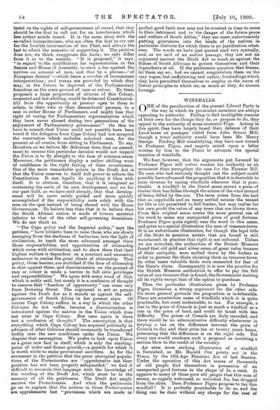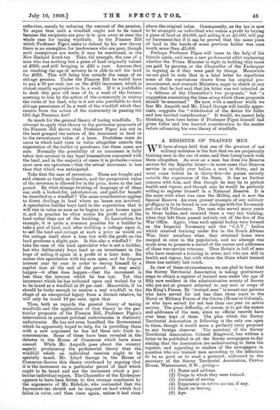WINDFALLS.
ONE of the peculiarities of the present Liberal Party is the way in which its prominent members are always appealing to authority. Failing to find intelligible reasons of their own for the things they do, or propose to do, they appeal to the authority of some economic Pope. Acting in this spirit, they have largely based their defence of their Land-taxes on passages culled from John Stuart Mill, though a truer authority would have been Mr. 'Henry George. Finding Mill unsatisfying, they have now turned to Professor Pigou, and eagerly seized upon a letter written by him to the Times to advocate the special taxation of windfalls.
We fear, however, that the arguments put forward by Professor Pigou will rather weaken his authority as .an economist than strengthen the case for the Finance Bill. No man who had seriously thought out the subject could possibly have advanced the proposition that it is desirable to raise revenue by taxing windfalls wherever that is prac- ticable. A windfall in the literal sense means a piece of timber that has fallen through the action of the wind instead of being felled by the axe. The term arises from the fact that on copy holds and on many settled estates the tenant for life is not permitted to fell timber, but may realise for his own profit the value of any trees that are blown down. From this original sense comes the more general use of the word to mean any unexpected piece of good fortune. Professor Pigou quite rightly uses the word in this sense, and gives as a special illustration the case of treasure-trove. It is an unfortunate illustration, for though the legal title of the State to precious metals that are found is still maintained, in practice that right is not enforced. Unless we are mistaken, the authorities of the British Museum found that old gold and silver coins, of great value because of their antiquity, were melted down by the finders in order to prevent the State claiming them as treasure-trove. In other cases valuable finds were concealed for fear of the State's claim. Consequently it is now the practice for the British Museum authorities to offer to pay the full value of any treasure that is found, the Government waiving all its rights except that of the option to purchase.
Thus the particular illustration given by Professor Pigou furnishes a strong argument for the other side. On more general grounds the proposition is indefensible. There are numberless cases of windfalls which it is quite practicable, but most undesirable, to tax. For example, a rise in the price of Consols is just as much a windfall as a rise in the price of land, and could be taxed with less difficulty. The prices of Consols are daily recorded, and there would be no administrative difficulty whatsoever in levying a tax on the difference between the price of Cousols to-day and their price ten or twenty years hence, presuming that the difference is on the right side. Yet every one would condemn such a proposal as involving a serious blow to the credit of the country.
An even more striking illustration of a windfall is furnished, as Mr. Harold Cox points out in the Times, by the Old-Age Pensions Act of last Session. Under the operation of this Act scores of thousands of old people find themselves in possession of an unexpected good fortune in the shape of 5s. a week. It appears to many of these poor old people that this sum of money, so eagerly welcomed, so unlooked for, has dropped from the skies. Does Professor Pigou propose to tax this windfall ? It is perfectly practicable to do so, and the thing can be done without any charge for the cost of collection, merely by reducing the amount of the'pension. To argue that such a windfall ought not to be taxed because the recipients are poor is to give away at once the whole case for taxing windfalls. In the Finance Bill which Professor Pigou seeks to defend by his new theory there is no exemption for landowners who are poor, though such exemptions are made, it may be mentioned, in the New Zealand Land-tax Take, for example, the Ca130 of a man who has nothing but a piece of land originally valued at £500, and still bringing in .220 a year. Assume that on reaching the age of seventy he is able to sell his land for £825. This will bring him outside the range of an o/d-age pension. Under the Finance Bill he would have to pay a 20 per cent, tax on the £325 increment, which is almost exactly equivalent to is. a week. If it is justifiable to dock this poor old man of is. a week of the fortune accruing to him by the action of the community in raising the value of his land, why is it not also justifiable to dock old-age pensioners of ls a week of the windfall which they receive from the action of the community in passing the Old-Age Pensions Act?
So much for the general theory of taxino. windfalls. To attempt to apply that theory to the particular proposals of the Finance Bill shows that Professor Pigou has not in the least grasped the nature of the increment in land or in the reversionary value of a lease. Doubtless cases do occur in which land rises in value altogether outside the expectation of the holder or purchaser, but these cases are rare. Normally the possibility of an increment is fully taken into account in any legal transactions connected with the land, and in the majority of cases it is probable—since most men are optimists—that the actual increment is less than that which was anticipated.
Take first the case of reversions. These are bought and field almost as freely as Consols, and the prospective value of the reversion is allowed for in the price, down to the last pound. By what strange twisting of language or of ideas can such a looked-for, calculated-on, and paid-for benefit be described as a windfall ? The same consideration applies to direct dealings in land where no leases are involved. A speculative builder buys land in the expectation that it will rise in value as soon as he begins to put houses upon it, and in practice he often makes his profit out of the laud rather than out of the building. In Lancashire, for example, it is quite a common practice for a builder to take a plot of land, and, after building a cottage upon it, to sell the land and cottage at such a price as would on the cottage itself show a loss, but with the profit on the land produces a slight gain. Is this also a windfall ? Or take the case of the land speculator who is not a builder, but who deliberately buys land as an investment in the Lope of selling it again at a profit at a later date. He makes this speculation with his eyes open, aud he forgoes interest year by Year in order to recoup himself by a capital sum at the end of the period. It may easily happen—it often does happen—that the increment is less than the interest which he has lost. Yet this increment which he has reckoned upon and waited for is to be taxed as a windfall at 20 per cent. Meanwhile, if he should be lucky enough to receive a real windfall in the shape of an unexpected legacy from a distant relative, he will only be taxed 10 per cent. upon .that.
Thus, both as regards the general theory of taxing windfalls and the application of that theory to the par- ticular proposals of the Finance Bill, Professor Pigou's intervention in present political controversies is distinctly unfortunate. He has not even benefited the Government which he apparently hoped to help, for in providing them with a new argument he has led them into fresh in- consistencies. Some of these have been revealed in the debates in the House of Commons which have since ensued. While Mr. Asquith goes about the country eagerly proclaiming the professorial theory that the windfall which an individual receives ought to be specially taxed, Mr. Lloyd George in the House of Commons throws this theory overboard by arguing that it is the increment on a particular parcel of land which ought to be taxed and not the increment which a par- ticular individual enjoys. The Chancellor of the Exchequer appears to have been driven to this strange conclusion by the arguments of Mr. Ridsdale, who contended that the Increment-tax should not be imposed on land which had fallen in value, and then risen again, unless it had risen above the original value. Consequently, as the tax is now to be arranged, an individual who makes a profit by buying a piece of laud at £4,000, and selling it at £5,000, will pay no Increment-tax if it can be proved that the same piece of land in the hands of some previous holder was once worth more than £5,000.
Perhaps Professor Pigou will come to the help of his friends again, and issue a new professorial edict explaining whether the Prime Minister is right in holding that taxes are paid by persons, or the Chancellor of the Exchequer in arguing as if they were paid by things. Meanwhile we are glad to note that in a later letter he repudiates some of the conclusions drawn from his original pro- nouncement, and reminds Ministers, eager to clutch at any straw, that he had said that his letter was not intended as " a defence of the Chancellor's two proposals," but " suggestion concerning the lines along which those proposals should be examined." He now, with a candour which we fear Mr. Asquith and Mr. Lloyd George will hardly appre- ciate, -suggests the "withdrawal of the duties for fuller and less hurried consideration." It would, we cannot help thinking, have been better if Professor Pigou himself had given fuller and less hurried consideration to the matter before advancing his own theory of windfalls.











































 Previous page
Previous page